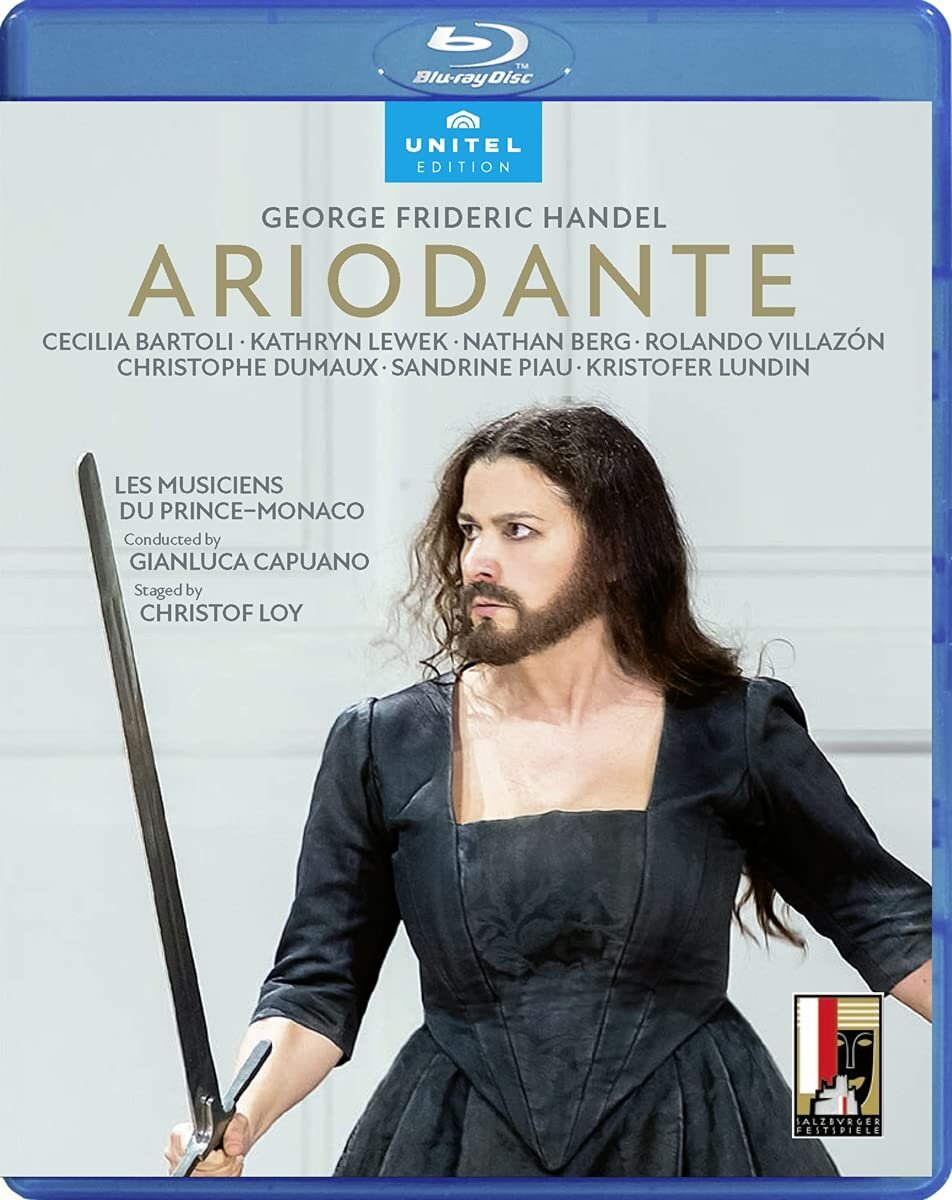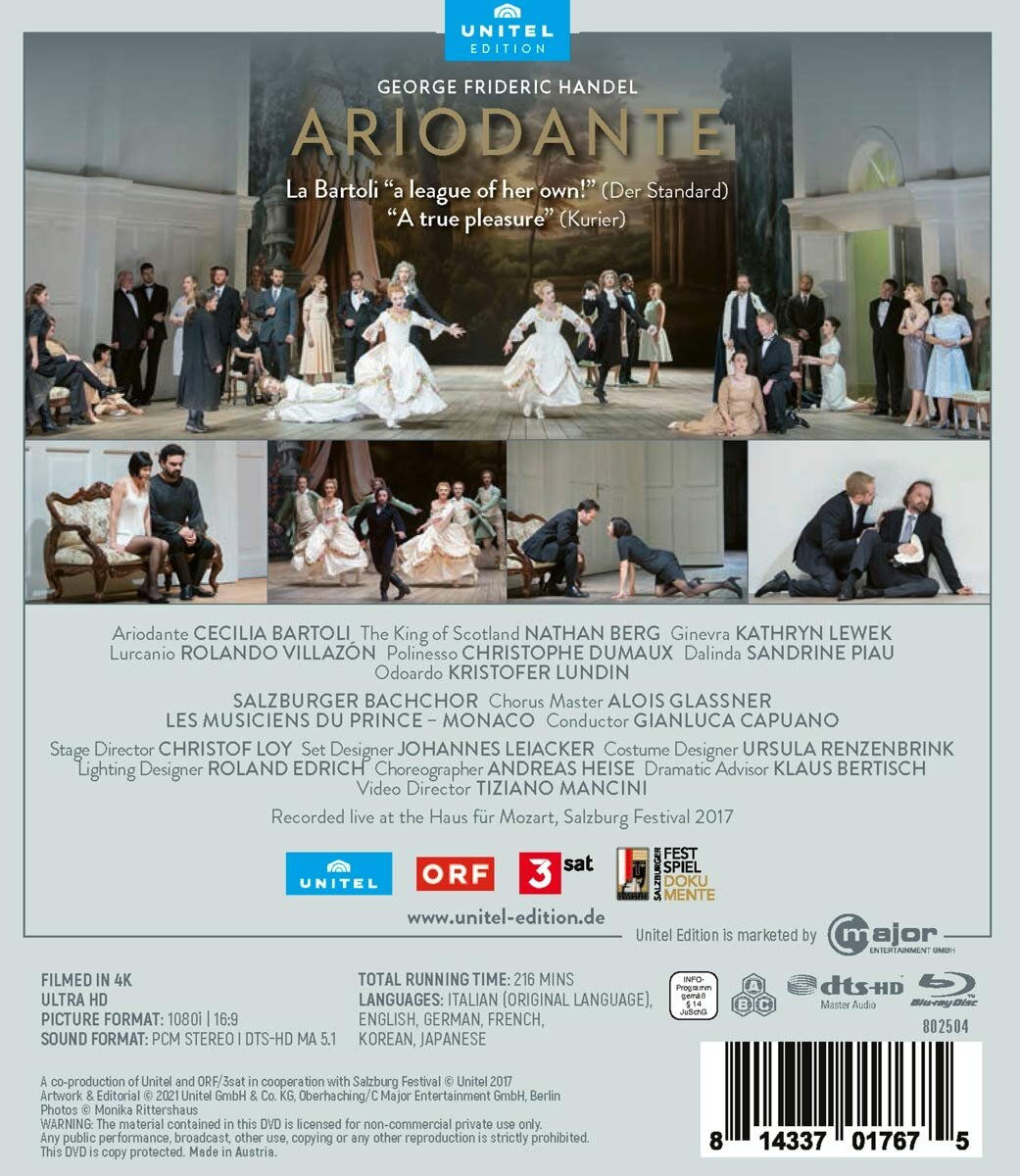

Handel Ariodante opera to a libretto by an anonymous author. Directed 2017 by Christof Loy at the Haus für Mozart as part of the Salzburg Festival. Stars Cecilia Bartoli (Ariodante), Nathan Berg (King of Scotland), Kathryn Lewek (Ginevra), Rolando Villazón (Lurcanio), Christophe Dumaux (Polinesso), Sandrine Piau (Dalinda), and Kristofer Lundin (Odoardo). Also stars dancers William John Banks, Christopher Basile, Andrew Cummings, Chris Agius Darmanin, Rouven Pabst, Glauber Silva, Rory Stead, and Jack Widdowson. Gianluca Capuano conducts Les Musiciens du Prince - Monaco and the Salzburger Bachchor (Chorus Master Alois Glassner). Set design by Johannes Leiacker; costume design by Ursula Renzenbrink; lighting design by Roland Edrich; choreography by Andreas Heise; dramatic advisor was Klaus Bertisch. Directed for TV by Tiziano Mancini. Sung in Italian. Released 2021, disc has 5.1 dts-HD Master Audio sound. Grade: A+
Look at the front cover above. Do you recognize Cecilia Bartoli appearing as a man with beard and sword? I didn’t. Nor did I notice the man is dressed as a woman. This image is part of director Loy’s overlay to Ariodante—inspired by the respect we have now for all aspects of innate human sexuality. With this alert, let’s identify the main characters in Ariodante.
We start with the villain—Duke Polinesso (Christophe Dumaux). Originally sung by an alto in trousers, today we give this to a counter-tenor. Below the Duke is surrounded by 8 courtiers played by dancers. According to the keepcase booklet, they are all men. But at least 3 of them will later appear as women in gorgeous dresses. It took me a while to catch on:
We are in Scotland. Below see Princess Ginevra (Kathryn Lewek), the aging King’s eligible daughter. Polinesso is in in hot pursuit. Whoever marries Ginevra will likely become the next King:
But the King has Ariodante (Cecilia Bartoli) in mind for Ginevra. A young vasal prince, Ariodante would be a safer match than an ambitious Duke. Below we see Ariodante meeting Ginevra for the first time. Ariodante is sung by a mezzo in trousers; and Cecilia is, of course, a world famous Handel mezzo. H’m: the 3 main characters sing in what we usually consider female voice types. This got director Loy thinking: “Why not finish the job by turning Ariodante into a woman? That will keep the folks at Salzburg awake!”
So Loy starts the action during the overture before the libretto kicks in. He invented Recitation 1 spoken by a mysterious female voice as seen below:
Here is the complete opening recitation [Disc Chapter 3]:
“He, for there could be no doubt of his sex . . . though the fashion of the time did something to disguise it. He felt the need of something which he could attach his floating heart to. That heart that every evening seemed filled with spiced and amorous gales. He was none of those who tread lightly the sarabande and gavotta. He was clumsy and a little absentminded. He much preferred the plain dances of his own country which he had danced as a child. He stared, trembled, turned hot, turned cold. Finally, he stopped in front of the unknown. She was a woman.“ (There will be a another even wilder Recitation 2 at the beginning of Act 3.)
Next below is a better image of Ginevra and Ariodante falling in love:
Now we meet Dalinda (Sandrine Piau), Ginevra’s best friend. Piau is a successful soprano. But if she lost her singing voice, she could probably start a new career as movie star. Her rendition of Dalinda contains the most spectacular acting I’ve seen in more than 12 years of reviewing Blu-ray opera recordings. Better than Callas. Better than d'Oustrac, Damrau, or Opolais to mention a few. Loy couldn’t restrain her, and maybe she’s guilty here of speeding. But I think you could show her Dalinda in a psychiatry course to explain how a privileged women can wind up getting battered by the man she falls for. Handel knew the type:
And guess who Dalinda is in love with? Of course it’s the Duke. Because Dalinda is close to the Princess, the Duke sees a way to ruin the love between Ginevra and Ariodante. I’ll say nothing more in this review about the fairly typical Baroque opera plot the Duke cooks up. You know all will end well. We will focus on now what makes this title, as one print critic said, “compulsively watchable”:
Oh, yes. An old friend shows up: Rolando Villazón as Lurcanio, the brother of Ariodante. He’s madly in love with Dalinda:
Finally, Nathan Berg is the King of Scotland. Handel writes for two of the bravest men imaginable playing natural horns (flawlessly) on stage supporting a king. (Not a good time to splatter a note):
Another feature of this opera is the dancing Handel builds into the libretto. Loy recruits many of the singers to dance (surprisingly well). The beautiful image below is from the end the dancing at the wedding announcement party. Three members of the men’s dance corps appear in flagrant stage-shepherdess drag:
Now Ariodante is tricked into thinking Ginevra has been unfaithful. He goes into mourning and puts on Ginevra’s nice black dress!
Soon the transition from male to female is underway:
Having been falsely dishonored, Ginevra is in misery. But Lewek is not about to be run off the stage by the more famous women in the cast:
Ginevra asks for death, and she gets a visit from Him. But He declines to take her—and puts her to sleep instead. Lewek really cuts loose in a traditional Baroque opera dream scene with happy themes and orgiastic nightmares:
After the dream scene, we move into the last act. Now we encounter Loy’s Recitation 2 about Ariodante:
“Trumpeters blow one terrific blast: THE TRUTH! He woke up. He stretched himself. He rose. He stood before us in complete nakedness. . . and while the trumpets pealed TRUTH! TRUTH! TRUTH! We have no choice left but to confess he was a woman. He looked himself up and down, without showing any signs of discomposure. And indeed for the time being she seemed to vacillate. She was man; she was woman; she knew the secrets, shared the weaknesses of each. It was a most bewildering and whirligig state of mind to be in.“ [Disc Chapter 45]
There follows a duel to the death to decide the question of Ginevra’s honor. Against Ginevra is Lurcanio, who still thinks Ginevra was unfaithful and that Ariodante killed himself in a fit of madness.
Everyone is astonished when Ariodante suddenly appears to defend Ginevra. No one seems to notice Ariodante has turned into a woman!
The Duke is dead and all is well for Ginevra and her Princess:
Dalinda has learned about finding that good man. She repents and gives Lurcanio some hope that she may learn to love him. He agrees that hope is good place to start.
My favorite review was by Fred Cohn writing in the November 2021 Opera News at pages 60-61. Cohn focuses on the music with its “human truth that shines through number after number performed by a cast of nonpareil Handelians.” He especially lauds Piau saying “it’s as if Isabelle Huppert could sing” and welcomes Villazón whose “beauty of tone and musicality” from 20 years ago has returned. Cohn sums up: “Splender onstage; splendor in the pit.” Richard Lawrence asserts (see pages 79-82 of the July 2021 Gramophone), that director Loy went “completely bonkers” in his staging of Ariodante. But Lawrence is won over by “performances of deep emotion, tenderness, subtlety and—sometimes—extravagance.” Lawrence also likes the period-instrument orchestra. Finally, our own Handelian Wonk, Lewis Chang, is wildly enthusiastic after played the disc multiple times.
This is the only modern video of Ariodante. Mary Hunter, writing in Grove Book of Operas, 2nd Edition, says this is one of Handel’s “greatest and most appealing” operas. But it’s rarely performed: it’s long, has built-in dance episodes, and needs “singers of special quality.” Well, it’s long at 216 minutes. But the time goes fast with a great orchestra, top singers, astute personal directing, fine dancing, and a nice mise-en-scène. SQ and PQ are fine and the video file by Tiziano Mancini is riveting. So here’s yet another almost-forgotten treasure now dug up for us to enjoy, wherever we live, by the magic of HDVD recording. Grade: A+
Here’s an official trailer:
OR



















